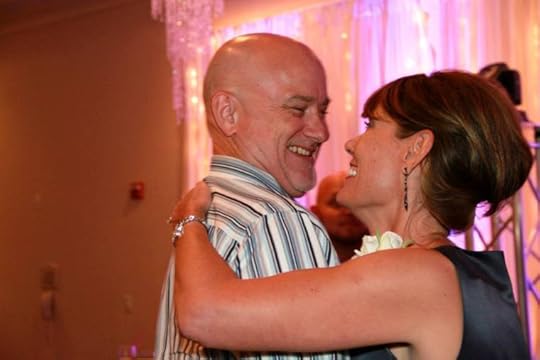Kenneth A. Camp's Blog, page 5
February 20, 2018
One Simple Truth that Will Help Us Live a Missional Life
You probably have heard the saying, “Love is a choice, not a feeling.” I am not sure I have always understood what that meant. And maybe you have heard this, “Greater love no one has than this, to lay down their life for a friend.”

I think I can intellectually wrap my mind around that, but only because I am a Christian who has heard most of my life that Jesus laid down his life for us. But what does that look like in real life? How does a selfish person like I am choose to love, or even more difficult, sacrifice the things of my life for another?
If I am not “feeling that loving feeling” I struggle with showing love to others, even those closest to me. Now before you go and start thinking I am some really bad person, I love my wife and son more than anything. And yes, I do think that I will lay my life down for either one if the situation warranted it. And I do that now in some ways by giving up things that I want to do or love for their benefit. I even have some friends that make it on that list even though admittedly it’s a short list.
Still, even when I sacrifice things out of love for them, and for that relatively small group of friends, in the deepest crevices of my soul, I expect for them to love me back. That doesn’t look like “love as a choice” or “laying my life down” to me.
Here Is the Big Question
Will You Love Only Those Who Love You Back?
This is when loving others gets challenging.
Seeing churches put a focus on “getting outside of the walls” of the church is a good thing. It does take some selflessness to help people who need help, to take vacation time and finances to go on a short-term mission trip, to mentor a child who has a difficult home situation, and to bring a child from a hard place into your own family.
But what happens to our compassion and love if the less-fortunate person shows no appreciation for our help, or worse, abuses it? What if the people who you spend time and money to share the love of Christ with outright rejects you, maybe even with violence? How many families who bring a child into their home get in return from that child anger and anguish?
Will you continue to love them?
I will be honest with you. I can’t do it.
You probably didn’t expect to hear me say that. But the truth is, neither can you. You and I will take offense. We will decide to not help them ever again or worse to not love them anymore.
How can we choose to love sacrificially in the face of rejection? If we are going to embrace God’s call to live a life sent or on mission, we need to know the answer to this question.
Yes, the answer is Jesus.
But it’s more than just saying Jesus is the Answer. He needs to be the Answer. This is important to understand.
Jesus doesn’t expect us to follow His example. He knows we will fail every single time. Instead He invites us to channel His love.
This Is the Simple Truth.
He describes the relationship like a vine that we are grafted in. His sacrificial love flows through us when we remain in Him.
When we recognize this truth and focus on remaining in Him, then we do love even when others don’t love back.
Will You Love Only Those Who Love You Back? The answer is yes if it is Jesus loving them through you in the first place.
February 15, 2018
5 Reasons Foster Parents Need to Attach to their Foster Child
You bring a child or sibling group into your home for who knows how long. You don’t know very much about them. You work at creating as much calm as you can in the midst of a new normal for everyone. Parent visits, school work, possibly counselor visits, and behavioral challenges make the transition challenging.
You focus on providing as much as care and support as you can for your new foster child. Yet at the same time you guard your heart. If you have had much training, you know that your new foster child will come with some attachment struggles. But you logically reason that you need to tread carefully since your foster child will probably live with you for only a few months.
Some foster parents allow themselves to attach to a child knowing that it will hurt when the child leaves. But many caregivers keep a wall between the child and their heart. They feel that it doesn’t help anyone for the attachment to grow because it really will hurt when the child goes back home or to another family.
When CPS placed our foster son with us, they told me that he would be with us for only a few weeks at most. So I didn’t try to attach to him. I focused on his physical needs especially since he was only eight-months-old. I made sure, along with Danielle, that his diapers stayed dry, that he ate on a regular schedule, and that he slept as much as possible.
Finally one day I knew in my spirit that I had to let myself attach to him. I needed that as much as he needed it. Since those days I learned more about my own attachment style which growing up was what is called Avoidant. Over the years I have a more Secure attachment style, which is called an Earned Secure attachment style. But, in the context of having a foster son who I “knew” was there for only a few weeks or months at the most, I reverted easily to my Avoidant attachment style.
That was not what my son needed. He needed for me to do everything I could to securely attach to him. I needed to love him as if he were my own son. Even though it took me some weeks to go there, I finally did.
Now he is my adopted son, but I had no idea he would be one day when I made that decision to let my heart attach to him.
If you are a foster parent or one who is considering fostering, I hope you will allow yourself to securely attach to your foster child.
5 Reasons Foster Parents Need to Attach to their Foster Child
A child who experiences trauma most likely has an insecure attachment, probably even a disorganized attachment style.
A child needs someone to model healthy attachment.
When a foster parent guards their heart, they model an insecure attachment style.
If a foster parent and foster child develop a healthy attachment, the child will experience deeper healing, learn to trust a caregiver, and set them up for future relational success.
When the time comes for the foster child to return home or move to another family, the healthy attachment with the foster parents will be a positive memory they can replay over and over.
Want to learn more about attachment styles? Read What Is Your Attachment Dance?
Listen to a great podcast interview I did with my friend Marshall Lyles about the attachment style we as parents bring to the relationship. Click HERE. (This podcast episode is also found in my book—Foster and Adoptive Parenting: Authentic Stories that Will Inspire and Encourage Parenting with Connection
Did you enjoy this blog post? Please share it with your friends and followers.
February 12, 2018
What Do Our Missionaries Need? [Podcast 41]
We send missionaries all over the world, many into locations that involve danger or at least extreme isolation. Even missionaries in places they can serve openly face challenges that we might not understand. The truth is those of us who “send” missionaries don’t always do a good job of it.

We act as if we don’t understand that we all are commissioned to be a part of going to the nations.
When we don’t send our missionaries well, the work of going to the nations with the Good News of salvation through Jesus Christ suffers. It reveals our true hearts.
This reality became clear to me a few years ago while working with a missionary in Macau. At the time, her and her husband had been on the field for over 25 years. I asked her who her home church in America was. Her reply stunned me. She said that since they had been gone for so long, they really didn’t have one anymore.
That conversation has stuck with me, and over the years it motivates me to work harder at connecting with those I know serving around the world. It led me to begin podcasting over a year ago so that I can bring interviews to you of different missionaries. My hope is that hearing from them in their own voice as they share with you their story will compel you to engage more deeply with the work they are doing.
Awhile back I asked a few of my missionaries friends this question, “What are some common challenges you face on the field?” I compiled their answers into a list of 13 common challenges and shared that with you in a blog.
Today I want you to listen to this podcast episode where I expound on their answers and give you ideas of how you can connect more deeply with missionaries you know.
Will you listen to the podcast and make notes of ways you can come alongside a missionary and support them?
13 Common Challenges Missionaries Face
Language acquisition
Lack of training
Character issues
Team struggles
Lack of financial support
Lack of resources
Flexibility
Culture shock
Disappointment
Isolation
Marriage tension
Parenting
Spiritual attack
These are books that I have read over the past several years. They challenge and equip me to live a life on mission.
When Helping Hurts: How to Alleviate Poverty Without Hurting the Poor . . . and Yourself This book helped me understand how to truly help someone who is in need. I have applied these principles in many areas.
Radical: Taking Back Your Faith from the American Dream David Platt challenges us to live life centered on others. The book also provides practical application.
The Hole in Our Gospel Special Edition: What Does God Expect of Us? The Answer That Changed My Life and Might Just Change the World Richard Stearns, CEO of World Vision, “uses his journey to demonstrate how the gospel-the whole gospel-was always meant to be a world changingsocial revolution, a revolution that begins with us.”
The Forgotten Ways: Reactivating Apostolic Movements
Enough: Finding More by Living with Less
The Key to the Missionary Problem
The Art of Neighboring: Building Genuine Relationships Right Outside Your Door
The Monkey and the Fish: Liquid Leadership for a Third-Culture Church (Leadership Network Innovation Series) I read this book while riding in a van in the middle of Thailand. One of my favorites.
Thanks for listening!
To share your thoughts:
Leave a note in the comments below
Comment and share this show on Facebook, Twitter, LinkedIn, or Pinterest
To help out the show:
Leave an honest review on iTunes. I need all the reviews I can get and they really do help!
Subscribe on iTunes.
February 5, 2018
A Review of “God and Money” by John Cortines and Gregory Baumer
I recently read, God and Money: How We Discovered True Riches at Harvard Business School by Gregory Baumer and John Cortines – Paperback, given to me by a good friend.

The authors, John Cortines and Gregory Baumer, both graduates from Harvard Business School, met in a men’s Bible study group where they were confronted with a question, “As young Christians with sky-high earnings potential, what should they plant to do with their money?”
Before you think that this book isn’t for you, think with me for a minute. God promises to meet all of our physical needs. God also is the One who gives any person the ability to create wealth. God intends for you to have every need met and to have more than you need.
If you believe those statements, the question is how will you handle the “more” that comes your way.
I think Cortines and Baumer do a good job of addressing how to view wealth in their book.
Here are some highlights and some of my thoughts from the book:
7 Core Principles for Biblical Wealth and Giving
Everything we own belongs to God. How we view this statement will impact how we apply financial principles.
Our wealth and possessions should be used for God’s purposes. In order to agree with this we have to agree with the first principle.
Wealth is like dynamite with potential for good and harm. We can all think of examples of both.
Worldly wealth is fleeting; heavenly treasure is eternal. This takes having a kingdom mentality.
Giving generously to the poor is a moral duty in a fallen world. This section challenged me, and I typically have a generous approach to meeting the needs of the poor.
Giving should be voluntary, generous, cheerful, and needs-based. How well we do this reveals the true nature of our heart.
Giving generously breaks the power of money over us. The Bible verse that tells us, “where are treasure is there also our heart will be”, is truth.
Trends and Movements in Generosity
After laying out relational, spiritual, and medical reasons to give, the authors divulge stats that show that Christians don’t give away very much money. I agree with their assessment that if the Christian population would simply embrace a culture of giving, the results would be staggering. I want to be a part of a generous culture.
The “Three S Framework” – Spender, Saver, or Servant?
Most financial experts talk about the first two, Save and Spend. They might ask you which are you? And in most marriages one spouse is a saver, and the other is a spender.
This section in the book offers some practical ways to approach spending and saving along with tools to help you set a spending limit and to help you save wisely.
But what about a Servant approach to your finances? This is could be a new concept for many. Approaching your finances as a Servant will impact the way you spend and save.
A couple of concepts I am mulling over is “a spending limit” and “an end-game”.
Having a spending limit is kind of like a budget with a twist. Let’s say for example you have a household income of $100,000. A budget would simply track how you spend that $100,000. However, a spending limit decides, for example, that you will spend only $80,000. So you budget for the $80,000.
Most people increase their spending if and when their income increases. A spending limit decides what a family needs to live comfortably irregardless to the level of income.
The “end-game” refers to how much we need to save for our future, such as, retirement. One common school of thought is that we should save as much as we can. But the authors challenge this mindset. Instead, they suggest, with input from trusted peers, to determine how much is enough for retirement. Then once that ‘end-game” is accomplished, earmark additional funds for Kingdom purposes.
Three Giving Goals
I appreciated this simple approach to help a family decide how and to whom to give:
Gospel centered
Alignment with personal ministry calling
Maximum effectiveness
Stewardship in Community
This thought challenges me the most. The idea is to form close enough bond with other believers so that you can share how you handle your finances, allow others to speak into how you spend, save, and serve. The authors spoke of the idea of even putting together a form of an advisory board who gives feedback on your annual spending limits and your end-game amount.
In all of my relationships with other believers, “money” is treated like a taboo subject. Even though this would stretch me, I would gladly welcome this.
Recommended!
If you want to live a life on mission, one that is aligned with God’s purpose for you, a life that glorifies Him by how you handle your finances, I highly recommend this book.
You can purchase it by clicking on the title here—God and Money: How We Discovered True Riches at Harvard Business School by Gregory Baumer and John Cortines – Paperback
February 1, 2018
We All Need a Family [Podcast 40]
I know that children shelters and orphanages serve a purpose, but we all need a family to help us heal and be the best we can be.

In today’s episode I refer to a story a friend told me about their daughter that they adopted from Ethiopia. My friend’s daughter didn’t cry when she hurt herself.
Listen to what they did to help their daughter cry. I also share some simple reminders for foster and adoptive parents. You are doing a great work!
This podcast is brought to you by Stand Up Eight. If you are an adoptive family in the greater Austin area and you want some in-home professional support, please check them out at www.Standupeightatx.org. Also, if you tell them that I referred you, they will give you 50% off the first months fee.
As promised, here is the LINK to the registration for their 1st annual Friendraiser if you are seeing this prior to February 6, 2018.
January 30, 2018
This One Thing Is Necessary to Live a Missional Life
We see the world through a limited lens. We only know what we know. And if we always look at things from the same viewpoint, what we know and understand probably has no chance of changing.

In today’s western culture, individuals have more ways of expressing their worldview than in any other time in history. I get to do that every day with my blog, podcast, and social media posts. I guess that’s all a good thing, but I wonder if we have lost our ability, or maybe it’s patience, to listen.
In case you didn’t already know these things about me, here are some facts that shape the way I see the world:
I was born in 1961 putting me in the baby boomer generation. I grew up seeing news reports about Vietnam, civil rights marches, and women burning their bras.
The first few years of my life our family moved a few times mainly because my father served in the Navy, then took a job in Maryland. However, I have lived in Texas since about age eight.
I am white, a Christian, and hold to conservative political beliefs.
I am a home and property owner.
I have traveled to many places around the world including, Central and South America, Canada, throughout Europe and East Asia, even living in Thailand for six months.
My job experience includes corporate jobs, ministry related jobs, and self-employment.
I volunteer with non profit organizations.
My wife and I adopted our son through foster care.
If that list is all you know about me, I guarantee that you have already made conclusions about who I am and what I think about the world around me. Some of those conclusions might even cause you to not want to know me better.
We all do this. We make conclusions about a person based on very limited understanding of who they are, sometimes simply by how they look even though as a child we are taught to not judge a book by its cover.
So what is the one thing that is necessary to live a life on mission?
(Defintion of “life on mission” or “missional lifestyle” – God chose to use people as His ambassadors of reconciliation. God sends us to share His Good News about the salvation He offers. That is the mission He sends us on.)
Learn how to see the world as other people understand it.
Over the years a few things have helped me do this.
Travel. Yes traveling to different parts of the world will expose you to other ways of living and seeing the world. But you can remain in your bubble if you choose to do so. Or, you can let go of your way of doing things and try to live with the locals as much as you can.
Taking time to listen. Listening is becoming a lost skill. To listen to a person whose life view is different than mine takes patience and compassion. I have to want to listen first before I can hear anything another person is saying.
Willingness to learn. I enjoy learning about how other people live; how they view the world; why they believe what they believe. Yes, sometimes what I learn and hear makes me uncomfortable, but when I stay in that uncomfortable place rather than push it away, I learn. I learn just as much about me as I do about the other person.
Here are a few few things I have learned:
I truly don’t see the whole picture.
By no choice of my own, I am part of a dominant race/culture.
Others won’t listen to me if I don’t listen to them.
People who are 10, 20, 30, 40 years different in age than me really will see the world differently.
How a person thinks about income or money available for basic needs will greatly impact their worldview. Some think about each day, others paycheck to paycheck, and others think generation to generation.
Some look through an earthly lens. Others view the world from an eternal perspective.
Why is all of this important?
Because it is the mission God sends us on. And if we want to be successful at this mission, we need to understand how others view the world.
January 22, 2018
Warning: You Might Be Dancing the Wrong Dance
Danielle and I took dance lessons several years ago which we both enjoyed. But let me tell you learning how to dance with a partner is very challenging unless you’re just a natural.

I am one of those guys who can’t dance very well. I have okay rhythm, but my challenge is sustaining it. So I usually end up doing my own dance which gets me “the look” from Danielle.
We learned different dance steps like the Country Two Step and the Triple Two Step. We learned the Waltz and the Jitterbug. When I danced with Danielle (she is a natural by the way), I struggled to relax because I was busy counting under my breath. “One-two-three One-two-three”…or “step, step, triple step, triple step, step, step.”
When we dance Danielle looks into my eyes and smiles enjoying the sweet moment of connection. Until I mutter and squeeze her hand. Then Danielle’s smile turns into a frown. We stop; get the rhythm back in our heads and take off again until I mess up and squeeze her hand again. If this continues, we both end up frustrated ready to give up dancing.
However, when I am on my game, and I am keeping on rhythm, we have a great time. We laugh and enjoy each other, and we feel connected.
Imagine though that if I not only struggled with dancing well, but I tried to dance a completely different dance. Danielle would have a choice. She could stop and walk away, probably a little on the angry side. Or she could pay attention to what my dance is and try to dance the same dance. That could work if the dance met the song playing. Well we could still dance together and be completely dancing to a different tune. That would be interesting.
Paying attention to the dance our child dances
A child with a trauma background or one that struggles with sensory challenges or autism often dances to a different dance than those around them. Often their dance seems to not have any detectable rhyme or reason. This makes it difficult to parent them, and even harder to connect with them.
So how do we help our kid who struggles dancing with others?
Recognize that their dance is different. Any child will have their own unique dance. But a child from a hard place will have one that probably is different than you expect. They interpret social cues differently making their dance different.
Be okay that they dance differently. We can place expectations on our child to dance a certain way or even to already know how to dance like and with others. This will end up frustrating both you and your child.
Pay attention to what dance they are dancing. Instead of assuming that your child knows the dance or dances like others, do some detective work. Observe their dance. Learn their dance.
Delay trying to change their dance. Focusing on changing their dance rather than connecting with them and empowering them will be met with great resistance. If we try to force to dance our dance, then we are dancing the wrong dance.
Try to dance their dance. You might find out that nothing is wrong with their dance. It is just different. If they need to learn a new dance, learning their dance first will give you insight into their world.
Patiently help them learn how to recognize the music that is playing. No one can dance well if they can’t recognize the tune that is playing. When I first learned how to dance, I had to listen to the beat and the rhythm. Then I thought what dance works with this music.
Teach them how to dance to the music. Even if your child dances a different dance, patiently helping them learn how to recognize the dance that others are dancing will help them relate to others better. But remember they may always have a different dance.
Relationships really are like a dance. The better we learn how to not only dance, but dance with a partner, helps us to connect better.
I think I will go see if I can learn my son’s dance steps a little better.
January 18, 2018
Does God Speak Your Language? An interview with Brian Smith about Davar [Podcast 039]
Do you like to hear a good story? Does your family tell the same stories over and over even passing some down from generation to generation?

Since the beginning of time, people have learned by hearing stories. Although many people groups formed an alphabet and a written language, to this day around 80% of the people in the world are oral preference learners. This is why it is important that we make audio recordings of God’s Word in as many languages as possible.
In today’s episode, I interview Brian Smith, chairman of the board of directors for Davar Partners International.
What you will hear on the podcast:
A couple of stories from mission trips that Brian and I went on together
The meaning of the word “Davar”
The importance of story telling
Why the work of recording audio versions of the Bible is important
The cost of an audio bible compared to a written bible.
…And much more
To make a donation or contact Davar Partners staff go to www.DavarPartners.com
Thanks for listening!
To share your thoughts:
Leave a note in the comments below
Comment and share this show on Facebook, Twitter, LinkedIn, or Pinterest
To help out the show:
Leave an honest review on iTunes. I need all the reviews I can get and they really do help!
Subscribe on iTunes.
A special thank you to Brian Smith for taking time to join me on this podcast episode!
January 15, 2018
What’s Happening at Missional Lifestyle and His Hands His Feet in 2018
Happy New Year! I enjoyed our holiday season, but I am ready to get back into a groove. It seemed like I was in the holi-daze from Thanksgiving through New Years. We did our annual beach week during Thanksgiving with my side of the family. Then Danielle, my son, and I took a 5-day cruise out of Galveston the second week of December. Then of course Christmas and New Years followed on the heels of that.

During the downtime and trips, I had time to think through what I hope 2018 to look like for me here at Missional Lifestyle and His Hands His Feet. (that is the blog and podcast for those who didn’t know) I am excited about this year. I hope you are too!
Here is what I am working on for 2018:
I will continue to create free written content that covers foster care/adoption and other missional topics like local ministry opportunities, foreign missions, mentoring/discipleship, generosity, and so on.
His Hands His Feet podcast enters its second year. I have more Dad to Dad episodes, interviews with foreign missionaries, interviews with non profit leaders, updates from Danielle and I about our adoption journey, and much more.
This year begins my sixth year of blogging and, as I mentioned, my second year of podcasting. I have published two books over the past six years too. I still love what I am doing, and I am always looking for ways to create better content for you.
In order to continue to spending the time I have over the past five years on the blog, podcast, and writing, I am developing some income streams to support my work.
What’s that look like?
I am working on a new book with my good friend, Matt Peacock, who is the executive director of Partners in Hope Lake Travis. The plan is to publish the book in the Fall of 2018. After recouping my expenses, all of the profits from this book will go to support Partners in Hope Lake Travis.
Many of you know that I launched a Patreon site at the end of 2017. I have another friend who is teaching me how to create some great exclusive video content to go along with audio content. For those who don’t know, this is a site where you can make a monthly monetary pledge supporting specifically His Hands His Feet podcast. If you want to not only provide funds to increase the quality and reach of the podcast, but also get exclusive content only for patrons, please visit the site.
Soon you will begin seeing some occasional blogs where I share with you about a service or product that I use or have used that I recommend. The blog will read a lot like a review and maybe include some how the service or product works. Included will be links to the service or product where you can purchase it if it is something you find useful. This is called affiliate marketing. I will never recommend something that I haven’t either used or highly recommend as something you can benefit from.
I also will launch a new Resource page soon where you can find many of these services and products.
You will also hear me on my podcasts begin promoting different products and services that could range from website hosting to foster care/adoption counseling.
I want to reiteriate that neither the blog or the podcast will get overrun with advertising, nor will I spam you with constant emails and advertisements. When I find something that I use that I like or has helped me, I want to share it with you. And for many of these, if you choose to use or purchase their product or service, I will get a small commission at no extra cost to you. In fact, you might even get a discount.
What else am I considering for 2018?
Speaking – I am developing a few talks that I can share with groups, conferences, and churches. The topics will mirror what I blog and podcast about—foster care/adoption, missional lifestyle, non profit ministry, and foreign missions.
Mentoring – I can provide mentoring and coaching in the areas of writing/blogging/podcasting, foster care/adoption, non profit organization, and developing a missions program.
Will you take a few minutes and let me know your thoughts on my plans for this year?
January 8, 2018
My Motivation for 2018
You won’t find things like bringing a child into your family as your own, spending time with a lonely widow or homeless man, or visiting someone in prison on too many 2018 resolution or goal lists.

I don’t know many people who wake up in the morning saying, “Today, I am going to leave my comfort zone and hang out with someone who looks, thinks, or acts differently than I do”.
Loving our neighbor as we love ourselves just isn’t how we are hard-wired. Instead we think of ourselves and our own family and close friends.
We need a motivation that prompts us to do things outside of ourselves. For many that is a sense of justice. Maybe some do it out of obligation or guilt. For others it is for the recognition that it brings.
So what is my motivation for 2018?
I am like many of you, I set some business goals for my writing, blogging, podcasting, and a couple of new things for this year.
I also set a couple of personal goals too. They are quite simple. One is to avoid complaining and criticizing. I do this in my mind more than I vocalize it, except around home. The flip side to that is to use words of kindness and encouragement.
My wife is doing the happy dance about that goal.
The other is one that I know will impact every area of my life, especially when it comes to successfully living a life sent. It doesn’t have anything to do with the external motivations listed above.
My one other goal is to spend scheduled, intimate time with God.
On our property, down the hill from our house we have a large oak tree with two benches under it. I have spent a lot of time clearing cedar and brush on our property, and I will often take a break sitting on one of those benches. I find peace in the beauty, and it directs my thoughts and heart toward God.


But what happens far too often is that I don’t prioritize times to spend with God. Yes, I will read some scripture in the morning. Some days I will journal some thoughts or prayers.
So I decided that I will spend 2-3 mornings by going down the hill without my phone. Just my Bible, journal, and a pen. And spend time with God in what has become a sacred place for me.
Our church called us to a time of prayer and fasting this week. That is how I am beginning 2018. Praying and fasting as I seek God. He is who makes it a priority to place a child into a family, who cares for the widow and the one who doesn’t have a place to call home. God doesn’t forget the one who is in prison, and yes, He set the example of leaving His place of comfort, not just comfort, perfection, and entering our world.
As I spend time with Him…as we spend time with Him, His nature becomes our nature.
If that is the one and only goal that I accomplish this year, it will be the best year ever.



